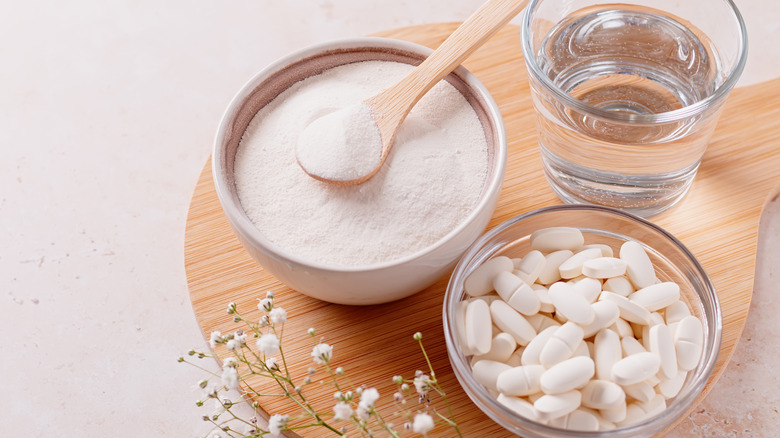The Main Signs That A Collagen Supplement Won't Work
Collagen supplements have become trendy in recent years as they are thought to help everything from joint, brain, and heart health to improving skin and hair.
Collagen not only helps strengthen bones, tendons, and ligaments but also helps fortify blood vessels and build muscle. Your body makes collagen on its own without any supplements but over the years you lose this important protein as you age (via WebMD). Smoking and consuming too much sugar can also dampen your collagen production.
In food, collagen is found in meat, specifically in the connective tissue — so eating animal skin provides collagen. Boosting collagen is also one of the surprising benefits of consuming bone broth. However, it's not always easy to optimize through food because it can be difficult to get it into your diet on a regular basis and also because scientists aren't exactly sure how much your body absorbs collagen through food (via Healthline). That can be where supplements come in.
If your supplement is vegan friendly
Supplement purporting to boost collagen are not regulated by the Food and Drug Administration (FDA), so you have to be careful when choosing one (via National Library of Medicine). Since they aren't monitored, companies can add ingredients to them that don't work.
To ensure that your supplement is optimal, start off by choosing a supplement that has no sugar. Then look for simple ingredients, such as collagen protein isolate, collagen hydrolysate, or hydrolyzed collagen.
The collagen in supplements is hydrolyzed (broken down) into very fine material so it's easier for the body to absorb. Supplements come in powder form or in capsules and it's important to read what those fine powders contain.
Since collagen is made from the connective tissue of animals, like fish, chicken, and beef, you might wonder if collagen supplements can be vegan. The simple answer is no. Steer clear of any supplements that claim to be vegan friendly. It's impossible to supply effective collagen in a supplement that doesn't contain animal sources.
Plant-based collagen supplements contain genetically engineered organisms like yeast to mimic collagen, but it's not pure collagen (via Medical News Today). Vegan supplements are expensive and there is no research that says it does anything to help boost your collagen.
If there is no vitamin C in your collagen supplement
Vitamin C is crucial in helping collagen work. Dermatologist Keira Barr, M.D. says, "Vitamin C is a key cofactor in the synthesis of collagen and elastin, [which helps] give your skin that plump and youthful appearance," (via mindbodygreen). So basically, if you aren't ingesting enough vitamin C, your supplement won't work.
Unlike collagen, vitamin C is not something that your body makes naturally. So, in order for the collagen supplements to work most effectively, you need to ingest vitamin C as well. The easiest way is to have it contained in the supplement itself because it's hard to eat enough vitamin C foods everyday and at the right times to ensure that your supplement is working.
With no FDA regulation, it can be difficult to know if the supplement is good but there are a few things you can look for (via Good Housekeeping). Check products on the NSF website, an independent certification organization that tests and inspects products.


